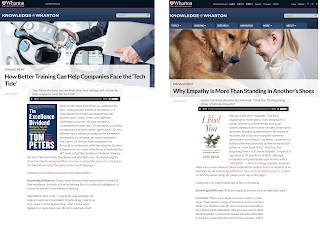My real purpose here is to rather provide the juxtaposition of two intents that are so amazingly contradictory to me, in the context of a commercial enterprise, in this age of crazy; and certainly I'm talking about the crazy in all other aspects of life; both in how we get our sensory matrices seemingly bludgeoned with every day with it now, either mediated, or in real time as we experience collateral damage first hand. And of course, all of this inside of crazy, insane, market competition, in at least a global context, for all involved, but also for workers in particular as well (the idea of competition is complex now precisely because so many sectors of our own economy have so many degrees of more, or less of it, depending on sector concentration by the various players).
Both of these intents, certainly, start out with the common assumption that "your employees are your main asset." Logical both in a practical sense, and a humanitarian one. Interesting, though how little a company's real bottom line encourages anything even remotely related to "practical, humanitarianism."
I was motivated initially to do this juxtaposition because it reminded me, yet again, of how Paul Goodman ridiculed the notion of poorly socialized young men in "Growing Up Absurd." In it he argued that it was not the process of socialization that was the problem (at least in the main part), but that what young men were being socialized into that might be of some question; already recognizing, as he did, that an operating system that based livelihoods on ever more empty consumption was not one to inspire long term social confidence in. And so now, naturally, we are in the age of "The Absurdity Of Growing Up;" because that is exactly what the people in control now desire; impulsive, informed only on a need to know basis, easily frightened, children.
This is why I viewed, with some suspicion, the subtitle of Mr. Peters book: "Meeting the Tech Tide With Work That Wows And Jobs That Last." Work that wows? Is that how you attract intelligent professionals? And jobs that last? Seriously? In the ever changing tech industry? You know, the one that is so enamored of "disruption" these days?
But hey. We can certainly cut Mr. Peters some slack here on that count. Book covers are marketing departments through and through, and who knows how much Mr. Peters either cringed, or whatever else, when he first saw it. And to be fair as well, selling the books is still an unavoidable bottom line, whatever you good intentions are, because authors need to eat, and sleep protected, etc., just like the rest of us.
And then we have the notion that encouraging empathy, as a company, would be a really good thing.
If only it were possible for the economic entities we call companies, that now enjoy most of the rights of citizenship, but few of the actual responsibilities; if only it were possible to instil empathy into them, as institutions. They would certainly be better places to work for. And I have actually worked at places where they tried to make an honest attempt at this. Not very successfully, unfortunately, but still.
The real fact of the matter is that hardly anything could be more important than well trained, empathetic citizens. The world would be an amazingly better place for it certainly. But do any of these people who push for this sort of thing think any further than getting a good idea out, even given that this is their livelihood, without much obvious indication that doing so in isolation, of what is actually going on in the world, will change about as much as it has already, historically, shown to be the case; which is not very frigging much? Do they not see the absurdity of it? I really have to wonder.
What do you think?
How Better Training Can Help Companies Face the ‘Tech Tide’
See Also:
[Post Note: Since I made reference to just how complicated competition has gotten I thought I'd better back it up with some further indications of that fact. J.V.]
[Post Note: Since I made reference to just how complicated competition has gotten I thought I'd better back it up with some further indications of that fact. J.V.]



No comments:
Post a Comment